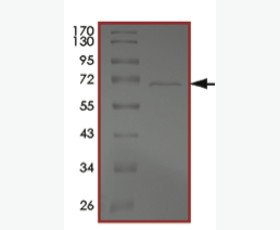Recombinant Human Prostaglandin-H2 D-Isomerase/PTGDS
| Product name: | Recombinant Human Prostaglandin-H2 D-Isomerase/PTGDS |
| Source: | Human Cells |
| Purity: | Greater than 95% as determined by reducing SDS-PAGE. |
| Buffer Formulation: | Supplied as a 0.2 μm filtered solution of 20mM TrisHCl,150mM NaCl,10%Glycerol,pH7.5. |
| Applications: | Applications:SDS-PAGE; WB; ELISA; IP. |
| Storage: | Avoid repeated freeze/thaw cycles. Store at 2-8 oC for one month. Aliquot and store at -80 oC for 12 months. |
| UOM: | 100ug/50ug/200ug/1mg/1g |
SourceHuman CellsDescriptionRecombinant Human Prostaglandin-D2 Synthase is produced by our Mammalian expression system and the target gene encoding Ala23-Gln190 is expressed with a 6His tag at the C-terminus.NamesProstaglandin-H2 D-Isomerase, Beta-Trace Protein, Cerebrin-28, Glutathione-Independent PGD Synthase, Lipocalin-Type Prostaglandin-D Synthase, Prostaglandin-D2 Synthase, PGD2 Synthase,PGDS, PGDS2, PTGDS, PDSAccession #P41222FormulationSupplied as a 0.2 μm filtered solution of 20mM TrisHCl,150mM NaCl,10%Glycerol,pH7.5.ShippingThe product is shipped on dry ice/ice packs.
StorageStore at < -20°C, stable for 6 months after receipt.
Please minimize freeze-thaw cycles.PurityGreater than 95% as determined by reducing SDS-PAGE.
EndotoxinLess than 0.1 ng/µg (1 IEU/µg) as determined by LAL test.Amino Acid Sequence
StorageStore at < -20°C, stable for 6 months after receipt.
Please minimize freeze-thaw cycles.PurityGreater than 95% as determined by reducing SDS-PAGE.
EndotoxinLess than 0.1 ng/µg (1 IEU/µg) as determined by LAL test.Amino Acid Sequence
APEAQVSVQPNFQQDKFLGRWFSAGLASNSSWLREKKAALSMCKSVVAPATDGGLNLTSTFLRKN QCETRTMLLQPAGSLGSYSYRSPHWGSTYSVSVVETDYDQYALLYSQGSKGPGEDFRMATLYSRT QTPRAELKEKFTAFCKAQGFTEDTIVFLPQTDKCMTEQVDHHHHHH
BackgroundProstaglandin-H2 D-Isomerase (PTGDS) belongs to the Lipocalin family of calycin superfamily. PTGDS is preferentially expressed in the brain. PTGDS catalyzes the conversion of PGH2 to PGD2, a prostaglandin involved in smooth muscle contraction/relaxation and a potent inhibitor of platelet aggregation. PTGDS is involved in a variety of CNS functions, such as sedation, REM sleep and PGE2-induced allodynia, and may have an anti-apoptotic role in oligodendrocytes. PTGDS binds small non-substrate lipophilic molecules and may act as a scavenger for harmful hydrophopic molecules and a secretory retinoid and thyroid hormone transporter. It possibly participates in development and maintenance of the blood-brain, blood-retina, blood-aqueous humor, blood-testis barrier, the central nervous system and male reproductive system.













